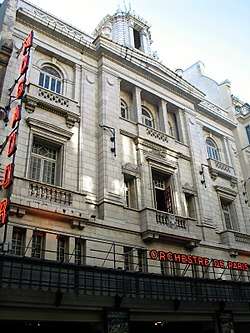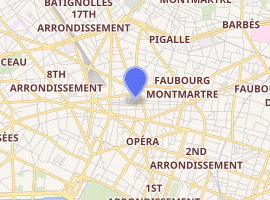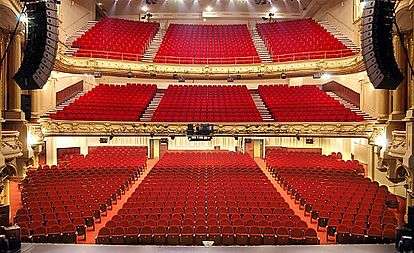Théâtre Mogador
Théâtre Mogador founded in 1913 and designed by Bertie Crewe, is a Parisian music hall theatre located at 25, rue de Mogador in the 9th district. It seats 1,800 people on three tiers.
 | |

| |
| Address | 25, rue de Mogador |
|---|---|
| Location | Paris |
| Coordinates | 48°52′31″N 2°19′52″E |
| Owner | Stage Entertainment |
| Capacity | 1,800 |
| Construction | |
| Opened | 1913 |
| Renovated | 1983 |
| Architect | Bertie Crewe |
| Website | |
| www | |

In 1913 financier Sir Alfred Butt rented an area in Paris. Built according to English music hall principles and style during World War I, the theatre was originally named the "Palace Theatre", after the like-named one in London, in order to appeal to British soldiers. The name was shortly thereafter changed to "Théâtre Mogador", Mogador being the old name of the town of Essaouira in Morocco. The inauguration guests include President Wilson, in France to negotiate the Treaty of Versailles.
It was inaugurated by US president to be Franklin Delano Roosevelt April 1919.
From 1920 it was a Cine-variety, and gained fame with the performances of Sergei Diaghilev's Ballets Russes, and with the Thés Mogador – performances of operettas and plays in the afternoon. Until the seventies, the Théâtre Mogador was mainly used for performances of operettas, including Mistinguett. Marcel Merkès was a regular performer here from the late 1940s to the mid-1970s.
An extensive renovation restored the building to new splendour in 1983. In 2005, it was purchased by the Stage Entertainment group (then called the "Stage Holding - The Theatre Group").
The theatre hosted the nineteenth Molière Awards (French theatre awards) on 9 May 2005.
On 26 September 2016 a fire damaged several parts of the theater, including the stage and props that would be used in the French-language production of The Phantom of the Opera.[1] Because of this, the show's French premiere was indefinitely postponed.
Notable productions
- The Ballets Russes (1920)
- No, no, Nanette (1930)
- L'Auberge du Cheval blanc (1930)
- Ça c'est parisien (1937-
- Hello, Dolly! (1972-
- In September 1981 The Clash played a seven night residency supported by Wah and The Beat
- La Légende de Jimmy - a rock opera about James Dean (22 September 1990 to February 1991)
- Les Misérables (1991-1992)
- Starmania (1993)
- Wild Woman Blues
- The Elvis story (2003-2004)
- Le Roi Lion (2007-2010)
- Mamma Mia! (2010-2012)
- Sister Act(2012-2013)
- La Belle et La Bête (2013-2014)
- Le Bal des Vampires (2014-2015)[2]
- Cats (2015-2016)
- Le Fantôme de l'Opéra - the production would take place in 2016, but due to the September fire, it was cancelled[3]
- Grease (2017-2018)
- Chicago (2018-2019)[4]
- Ghost the Musical (2019)[5]
- Le Roi Lion (2020-present)
See also
References
- "Fire Delays Paris Premiere of The Phantom of the Opera".
- "Musical Avenue" (in French).
- "Compte-rendu : dans les coulisses de "Chicago – Le musical" à Mogador". Musical Avenue (in French). Retrieved September 7, 2018.
- ""Ghost" au Théâtre Mogador pour la rentrée 2019 !". Musical Avenue (in French). Retrieved March 19, 2019.
External links
- (in French) Official website